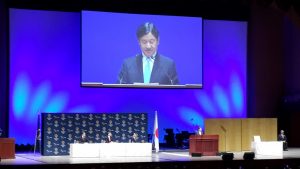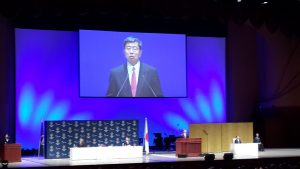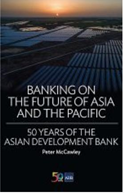Yokohama – Representatives from ABA member banks and the ABA Secretariat joined other delegates who attended the 50th Annual Meeting of the Board of Governors of the Asian Development Bank (ADB) held on May 4-7, 2017 in Yokohama, Japan. A total of some 6,000 participants joined the gathering, making it the biggest so far in terms of delegate turnout.
The attendees came from ADB’s 67 member countries – government officials, business leaders, academics, journalists, and representatives from civil society and development organizations – gathered at the Pacifico Yokohama for the 2017 annual meeting of the ADB, which was also a celebration of ADB’s 50 years of development work in Asia and the Pacific. The ABA Secretariat was represented by Deputy Secretary Mr. Amador R. Honrado Jr.
During the past ten years, the ADB has accredited the ABA as a Guest Association in the Annual Meetings of its Board of Directors: in Frankfurt, Germany (2016); Baku, Azerbaijan (2015); Astana, Kazakhstan (2014); New Delhi (2013); Manila (2012); Hanoi (2011); Tashkent (2010); Bali (2009); Madrid (2008); Kyoto (2007); Hyderabad (2006); and Istanbul (2005).
I. Highlights of the Yokohama Meeting
Operating under the theme of “Building Together the Prosperity of Asia”, this year’s Annual Meeting focused on the region’s growing need for infrastructure as a critical sector towards achieving sustainable and inclusive development. Discussions on how to address urban challenges and strive for clean and climate-resilient development were held.
The flagship Governors’ Seminar on 5 May discussed reforms in trade, investment, and finance, as well as lessons learned from the past 50 years of development in the region.

A special book launch, as part of ADB’s 50th anniversary celebrations, was held on 4 May to discuss and share ADB’s role and future direction.
Key sessions discussed salient issues central to development including rising inequality, macroeconomic stability, progress on the Sustainable Development Goals, and financial inclusion. The Annual Meeting highlighted the role of the private sector in supporting development programs in Asia and the Pacific through seminars focused on public-private partnerships and co-financing.
The host country, Japan, held several events including discussions on lessons from the Asian financial crisis 20 years later, and a youth event focused on reducing poverty and fostering inclusive economic growth.
II. Opening Session
 His Imperial Highness Prince Naruhito, the Crown Prince of Japan graced the Opening Ceremony of the 50th ADB Meeting.
His Imperial Highness Prince Naruhito, the Crown Prince of Japan graced the Opening Ceremony of the 50th ADB Meeting.
In his Opening Address, ADB President Takehiko Nakao said that more investments in infrastructure are needed to support continued growth in Asia and the Pacific and combat climate change. Investment in infrastructure, he said, will remain a priority for ADB as the bank prepares a new long-term strategy to respond to rapid regional changes.
In his remarks, Mr. Nakao said ADB’s achievements over the past half century can be summarized as combining knowledge and finance, promoting good policies, and fostering regional cooperation and friendship. He pointed out that ADB’s future direction will be led by Strategy 2030, ADB’s new long-term strategy that will map the best ways ADB can support Asia’s growth and address development challenges including poverty, climate change, urbanization, aging, and widening inequalities.
Investment in infrastructure will be an ADB priority under Strategy 2030, including enhanced support for infrastructure projects that incorporate advanced technologies. Mr. Nakao remarked that “Asia will need $1.7 trillion per year in investments in power, transport, telecommunications, and water through 2030.”
Support for social sectors, especially health and education, is a second ADB priority area under Strategy 2030. For this Mr. Nakao stated that ADB “will support universal healthcare systems and cross-border initiatives to combat communicable diseases such as malaria, tuberculosis, and HIV.”
 Strategy 2030 will also prioritize support for gender equality. Gender is a cross-cutting issue that influences all aspects of society and economic development. According to Mr. Nakao, ADB will “design projects that help women and girls secure higher skills, better health, more jobs, and a larger voice in decision-making.”
Strategy 2030 will also prioritize support for gender equality. Gender is a cross-cutting issue that influences all aspects of society and economic development. According to Mr. Nakao, ADB will “design projects that help women and girls secure higher skills, better health, more jobs, and a larger voice in decision-making.”
ADB will upgrade efforts to mobilize private resources for development, including through public–private partnerships under the emerging new long-term strategy. “ADB is supporting an increasing number of private sector projects in education, health, and agriculture,” said Mr. Nakao. “Funding micro-, small-, and medium-sized enterprises through local banks will remain a priority.”
Finally, Mr. Nakao stressed the need to continue to reform ADB as part of Strategy 2030. Among the reforms, he said ADB will “strengthen its sector and thematic expertise, enhance staff capacity, and streamline procedures.” Mr. Nakao added that the institution will deepen its collaboration with civil society, academia, the private sector, and local governments.
III. Seminar Sessions
A number of seminars were held during the course of the four-day event, including:

1. Actions for Sustainable Development in Aging Asia – The seminar discussed measures to promote Universal Health Coverage and sustainable development in aging Asia by strengthening medical and nursing care system, learning from Japanese lessons and experiences.
2. Twenty Years After the Asian Financial Crisis: Achievements and Ways Forward – The seminar discussed current issues and relevant approaches defining the future of regional financial cooperation
3. Where to Invest in ICT for Bigger Economic Impact – The seminar speakers presented research and evidence of ICT’s impact on the economy in developed and developing countries and made arguments for which sectors will derive the most economic benefit.
4. A Changing Landscape: The Next Generation of Infrastructure and Private Sector Financing – The seminar discussed current and emerging themes impacting private sector financing of infrastructure projects and drew implications for both investors and policy makers.

5. Social Inclusivity in the Age of Prosperity: The Case of Asia and Pacific Youth – The session highlighted the importance of working closely with youth through open dialogue between young people and the development practitioners on factors that affect youth participation. It also provided opportunities for knowledge exchange between development specialists about pressing issues related to key regional demographic changes.
6. Transcending the Middle-Income Challenge – The seminar discussed factors that lead to successful transition and how the region’s current crop of middle-income economies can benefit from these lessons.
7. Investing in Infrastructure in Asia: Mobilizing Private Sector Resources – The session panelists discussed the aspirations for and challenges to increasing investment in quality infrastructure in Asia, and specifically, what can be done to bring more bankable projects to market.
8. Addressing Rising Income and Wealth Inequality in Asia: Reflections for Strategy 2030 from Civil Society – The session explored ways in which ADB can advance an agenda for greater inclusive growth to address widening inequality, as it prepares its new strategy for 2030. Experts also discussed the causes of rising inequality, its consequences and possible solutions, in collaboration with various stakeholders.
9. Future Prospect of Quality Infrastructure Projects in Asia Through Public-Private Partnership – The speakers presented their views on the roles of the public and private sector in infrastructure investment, the effects of private participation, the expectations for Japanese stakeholders, and the current situation and future prospects of private sector participation in infrastructure projects in Asian countries.
10. The Future of Asian Finance – The seminar examined the growing demand for infrastructure development, the impact of finance in building an affluent middle class, and how innovations in financial technology can contribute to development. Panelists also discussed the evolution of Asian finance by 2030, and how public and private financial institutions, including their role-sharing models, may develop in the future.

11. Women’s Leadership for Vibrant, inclusive and Sustainable Asia – The speakers discussed how governments, companies, and citizens together can accelerate narrowing gender gaps at the workplace, forge women’s leadership, and contribute to a more vibrant, inclusive and innovative and sustainable society in Asia.
12. Mobilizing Asian Capital for Sustainable Development – The session explored ways to connect institutional investors with high-quality Asian infrastructure, covering green bonds, project bonds, multilateral financing, and credit enhancement opportunities in the international and local markets.
13. Promoting Inclusive and Accountable Public Services in Asia and the Pacific – The meeting provided a space for dialogue between civil society, government, and multilateral institutions on means to promote inclusive and accountable public services, leveraging citizen engagement through social accountability tools and practices and civil society partnerships with governments and ADB.
14. From Goals to Action: Integrating the Sustainable Development Goals in National Planning – The seminar brought together high-level representatives of government, civil society and development agencies to reflect on early progress in responding to the SDGs, the opportunities that have been created, and practical challenges encountered.
15. Prosperity in an Aging Society – Speakers looked at the challenges of aging societies, the opportunities that exist in the future as societies age, the sectors that will expand or contract, the lessons that can be learned from the Japan experience, and the impact on capital flows, including foreign direct investment, in the region.

16. Asian Banking in Challenging Times – The seminar examined the challenges and opportunities facing the banking system in emerging Asia; how Asia’s bank-centric financial system is coping with regulatory tightening along with credit quality and debt concerns, while continuing to support growth; how rapid technological change, like digital platforms and advanced data analytics, is transforming the banking system – redefining customer expectations, reducing costs, increasing competition, and promoting financial inclusion; and the enabling role of banks in advancing capital market development for better intermediation of the large regional savings pool.
17. Economic Development Experience and South-South Cooperation in the Asia Pacific Region – Panel speakers delivered presentations reflecting on their unique experiences of economic development as well as the efforts they have put in to share knowledge with the global community.
18. The Role of Innovation in Sustainable Urban Public Transport – The panelists discussed how cities determine suitable urban transport interventions (bus rapid transit, light rail transit, and metro rail transit), the impact of their choices on inclusive economic growth, and the role and challenges encountered by financiers like multilateral development banks in supporting these initiatives.

IV. Launching of an ADB History Book
 The book entitled Banking on the Future of Asia and the Pacific: 50 Years of the Asian Development Bank was released on May 4. It details ADB’s activities from its origin in 1966, illustrating the genesis of ADB regarding different proposals from across Asia and the Pacific, preparatory meetings in Bangkok, Manila and other cities, and collaboration of people within and outside the region to discuss the Charter, membership, and location of the Headquarters.
The book entitled Banking on the Future of Asia and the Pacific: 50 Years of the Asian Development Bank was released on May 4. It details ADB’s activities from its origin in 1966, illustrating the genesis of ADB regarding different proposals from across Asia and the Pacific, preparatory meetings in Bangkok, Manila and other cities, and collaboration of people within and outside the region to discuss the Charter, membership, and location of the Headquarters.
The book aims to review how ADB over 50 years has responded to Asia’s challenges given its unique regional perspective. It provides an objective and comprehensive account of ADB’s 50 years through three historical narratives—Asia’s economic development, the evolution of the international development agenda, and the story of ADB itself. ADB President Takehiko Nakao said that “the unique character of this book is to discuss Asia’s economic history, from the perspective of development and based on the rich experience of ADB’s interaction with countries.”
V. Second Annual ADB Private Sector-CNBC Awards
The ADB and CNBC presented the second annual ADB Private Sector-CNBC awards to businesses from India and the Philippines. Janalakshmi Financial Services and AP Renewables Inc. (APRI) were honored for their innovative and impactful private sector solutions to key development challenges. The awards focus on highly developmental transactions and underline the important work ADB clients undertake in developing countries in Asia and the Pacific.

Janalakshmi Financial Services, which works to increase access to finance and improve financial services to the underserved urban poor in India, received the award for Best Financial Sector Transaction. ADB signed and disbursed $150 million-rupee equivalent in debt to Janalakshmi Financial Services in December 2016 to help this urban-focused microfinance institution transition to a small finance bank, Jana Small Finance Bank.
The award for Best Project for Corporate Finance Transaction went to APRI, a subsidiary of leading Philippine power producer Aboitiz Power, one of the largest geothermal energy producers in the Philippines. APRI owns and operates the Tiwi and Makiling Banahaw (MakBan) geothermal facilities, the seventh and fourth largest geothermal power stations in the world, respectively.
VI. ADB Trust Fund to Promote the Integration of High-Level Technology and Innovative Solutions in Project Design and Implementation
The ADB announced the establishment of a trust fund to promote the integration of high-level technology (HLT) and innovative solutions in the design and implementation of its projects in Asia and the Pacific. The Government of Japan will be the first donor to the fund.
The High-Level Technology Fund will provide grants for technical assistance projects, investment projects, and recruitment of technology experts to promote the integration of HLT and innovative solutions throughout the project cycle — from identification to implementation – of ADB-financed and administered sovereign and non-sovereign projects. The HLT Fund will be operational by July.


Leave a Reply